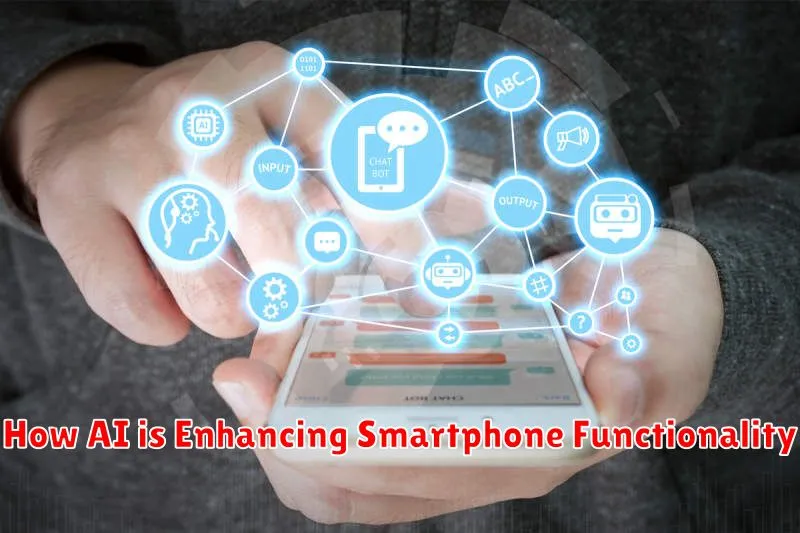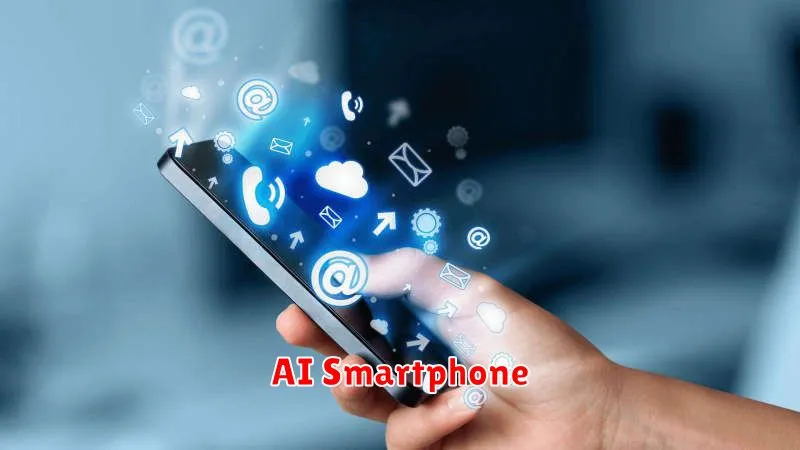From Siri and Google Assistant to facial recognition and AI-powered cameras, artificial intelligence (AI) has revolutionized the way we use our smartphones. AI is rapidly evolving, with new applications constantly emerging. But what does the future hold for AI in smartphones? What new features and experiences can we expect in the years to come?
This article delves into the exciting evolution of AI in smartphones, exploring the latest trends and innovations shaping the industry. We will examine the most groundbreaking AI features, discuss the potential challenges and ethical considerations, and speculate on what the next generation of AI-powered smartphones will offer.
How AI is Enhancing Smartphone Functionality

Artificial intelligence (AI) has become an integral part of our lives, and smartphones are no exception. With the advancement of AI technology, smartphones are becoming more intelligent and capable of performing tasks that were once thought to be impossible. From personalized recommendations to advanced image recognition, AI is revolutionizing the way we interact with our devices.
One of the most notable ways AI is enhancing smartphone functionality is through personalized experiences. AI algorithms analyze user data, such as browsing history, app usage, and location, to provide customized recommendations. This includes everything from suggesting relevant apps and articles to tailoring music playlists and news feeds. This personalization makes the smartphone experience more engaging and relevant to individual needs.
AI is also transforming photography on smartphones. AI-powered cameras can automatically adjust settings like exposure, white balance, and focus, resulting in stunning images even in challenging lighting conditions. Advanced image recognition algorithms can identify objects and scenes, enabling features like automatic tagging and object detection. AI-powered image editing tools can enhance photos with just a tap, making it easier than ever to capture and share beautiful memories.
Another area where AI is making a significant impact is in voice assistants. AI-powered virtual assistants like Siri, Google Assistant, and Alexa are becoming increasingly sophisticated. They can understand natural language, respond to complex requests, and even learn user preferences over time. This makes it possible to control various aspects of the smartphone using voice commands, from making calls and sending messages to setting alarms and controlling smart home devices.
AI is also improving security on smartphones. AI algorithms can detect and prevent malicious activity, such as phishing attempts and malware attacks. Facial recognition and fingerprint scanning are becoming increasingly secure thanks to AI, making it harder for unauthorized users to access personal data. AI-powered security features are essential in protecting our privacy and safeguarding sensitive information.
In conclusion, AI is rapidly changing the way we use our smartphones. From personalized experiences to advanced photography and improved security, AI is making our devices more intelligent, efficient, and user-friendly. As AI technology continues to evolve, we can expect even more innovative and transformative features to emerge in the future of smartphones.
The Future of AI in Mobile Devices
Artificial intelligence (AI) has become increasingly ubiquitous in smartphones, transforming the way we interact with our devices. From voice assistants like Siri and Google Assistant to advanced camera features and personalized recommendations, AI has revolutionized the mobile experience. But what does the future hold for AI in mobile devices? The possibilities are exciting and vast, with AI poised to become even more integrated and transformative.
One key area of development is in the realm of personalization. AI will be able to learn our preferences and habits even better, tailoring our experiences to our individual needs. This could involve smarter app recommendations, customized news feeds, and personalized health and fitness tracking. Imagine a smartphone that automatically adjusts its settings based on our location, time of day, and even our mood.
Another exciting prospect is the rise of on-device AI. With advancements in processor technology, AI models will be able to run directly on our smartphones, eliminating the need for constant cloud connectivity. This will result in faster response times, enhanced privacy, and reduced data consumption. We can expect to see even more sophisticated AI features, such as real-time language translation, object recognition, and advanced augmented reality experiences.
Furthermore, AI will play a crucial role in mobile security. It will be able to detect and prevent malicious activity, identify fraudulent transactions, and even safeguard our personal information. AI-powered security systems will continuously learn and adapt, staying ahead of evolving threats.
Ultimately, the future of AI in mobile devices is one of seamless integration, personalized experiences, and enhanced functionality. As AI technology continues to advance, our smartphones will become even more powerful, intuitive, and indispensable tools for our daily lives.
AI-Powered Features to Look for in 2024 Smartphones
As Artificial Intelligence (AI) continues to advance, it’s rapidly transforming the smartphone landscape. In 2024, we can expect to see a new wave of AI-powered features that will revolutionize how we interact with our devices. From intelligent assistants to enhanced photography, these features will offer a more personalized and seamless user experience.
Improved AI Assistants: Expect to see more sophisticated AI assistants that can understand complex commands, anticipate your needs, and seamlessly integrate with your apps and services. This will lead to a more intuitive and personalized user experience.
Advanced Image and Video Processing: AI will further enhance image and video processing capabilities, leading to higher quality photos and videos. Features like real-time object recognition, background blur, and AI-powered editing tools will become more prevalent.
Enhanced Security: AI will play a crucial role in bolstering smartphone security. Expect features like advanced facial recognition, AI-powered fraud detection, and real-time threat analysis to become more widespread.
Personalized Recommendations: AI algorithms will analyze your usage patterns and preferences to deliver personalized recommendations for apps, music, movies, and other content. This will lead to a more tailored and engaging experience.
Enhanced Battery Management: AI will optimize battery life by analyzing your usage patterns and dynamically adjusting power consumption. This will ensure that your smartphone lasts longer on a single charge.
Smart Home Integration: AI will enable seamless integration between your smartphone and smart home devices. This will allow you to control your lights, thermostats, and other appliances directly from your phone.
In 2024, AI will continue to drive innovation in the smartphone industry, offering a host of new and exciting features. As we embrace the power of AI, our smartphones will become even more intelligent, personalized, and convenient to use.
The Role of AI in Battery Optimization
AI is playing an increasingly important role in optimizing battery life in smartphones. One of the key ways it achieves this is through adaptive learning. By analyzing user behavior and app usage patterns, AI algorithms can identify power-hungry apps and adjust their resource allocation accordingly. This can involve temporarily suspending background processes or limiting network activity when not actively in use.
Another crucial aspect of AI-powered battery optimization is predictive analysis. AI models can anticipate future power needs based on past usage data and user location. This enables the phone to proactively activate power-saving modes or adjust brightness levels to conserve battery life.
Beyond these core functionalities, AI is also driving innovation in areas like dynamic power management, where the phone can adjust power consumption in real-time based on factors such as screen brightness, network connectivity, and temperature. AI also facilitates intelligent charging, optimizing charging speeds and minimizing battery degradation over time.
Challenges in Implementing AI in Smartphones

While the potential of AI in smartphones is undeniable, there are significant challenges in its implementation. One major hurdle is the limited processing power of smartphones. AI models often require extensive computational resources, making it difficult to run them efficiently on mobile devices without draining battery life and generating excessive heat.
Another challenge is the privacy and security of user data. AI-powered features often require access to personal information, raising concerns about potential misuse. Ensuring data protection and user consent is crucial to building trust in AI-powered smartphone applications.
The heterogeneity of smartphone hardware and software also poses a challenge. AI models need to be optimized for different platforms and specifications, requiring significant development efforts. Furthermore, consistent performance across varying devices remains a challenge, as does managing the complexity of diverse AI applications.
Finally, the user experience is paramount. AI features should be intuitive and easy to use, without creating a sense of overwhelming complexity. Balancing powerful AI capabilities with a user-friendly interface is a delicate balancing act.
Case Studies: AI Innovations in Smartphones
The integration of artificial intelligence (AI) into smartphones has revolutionized the way we use these devices. From personalized recommendations to advanced camera features, AI has become an integral part of the modern smartphone experience. Here are some notable case studies highlighting the transformative impact of AI in smartphones:
Smartphones with AI-powered Assistants
Apple’s Siri, Google Assistant, and Amazon Alexa are prime examples of AI-powered assistants that have redefined user interaction with smartphones. These assistants leverage natural language processing (NLP) and machine learning (ML) to understand user queries, provide relevant information, and execute commands. They offer a seamless and intuitive way to manage tasks, access information, and control connected devices.
AI-Enhanced Photography
AI has significantly enhanced smartphone photography capabilities. Features like scene recognition, object detection, and computational photography have enabled smartphones to capture stunning images in various lighting conditions and scenarios. For instance, Google’s Night Sight mode utilizes AI to capture bright and detailed images in low-light settings, while Apple’s Deep Fusion technology combines multiple images to enhance detail and reduce noise.
AI-Driven Battery Management
Optimizing battery life is crucial for smartphone users. AI algorithms are now being used to intelligently manage battery consumption, predicting usage patterns and adjusting power settings accordingly. This results in extended battery life and reduced power drain, enhancing the overall smartphone experience.
Personalized Recommendations
AI algorithms analyze user data, preferences, and behavior to provide personalized recommendations for apps, music, movies, and other content. This tailored approach enhances user experience by presenting relevant suggestions that cater to individual tastes. For example, streaming services like Netflix and Spotify leverage AI to suggest content based on user viewing history and listening preferences.
AI-Based Security Features
AI is increasingly used to enhance smartphone security. Facial recognition, fingerprint scanning, and on-device machine learning algorithms are employed to authenticate users and protect sensitive information. These features contribute to a more secure and trustworthy mobile experience.
These case studies demonstrate the significant role that AI plays in modern smartphones. From enhancing user experience to improving security, AI continues to transform the mobile landscape, and we can expect even more innovative applications of AI in future smartphones.

